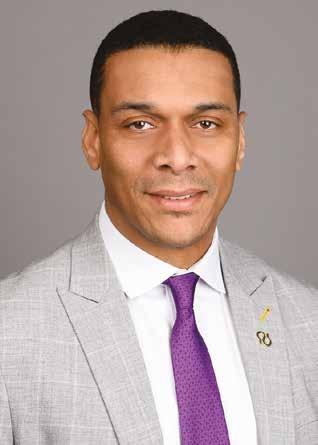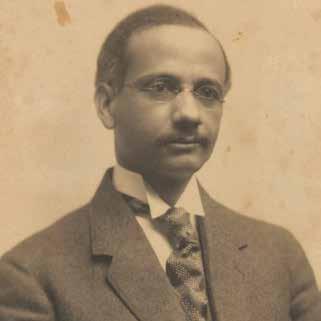
2 minute read
BLACK HISTORY MONTH BlackHistoryMonth:Q&AwithAlzheimer’sAssociationChiefDE&IOfficer,CarlV.Hill
from Compton Bulletin

In honor of Black History Month, Alzheimer’s Association Chief Diversity, Equity and Inclusion Officer, Carl V. Hill, Ph.D., MPH, shares his insights on the work he is leading to strengthen the Association’s outreach to all populations with emphasis on providing underserved and disproportionately affected communities with resources and support to address the Alzheimer’s crisis.
Advertisement
Who are some Alzheimer’s champions you admire in the Black/African American community?
When Dr. Alois Alzheimer began researching the disease that now bears his name – he selected several doctors from around the globe to be his research assistants in Germany, including Dr. Solomon Carter Fuller, the first known Black/African American psychiatrist, whose work includes some of the earliest publications on dementia in America. Dr. Fuller’s central presence in Dr. Alzheimer’s lab makes a point about representation. His involvement at the very beginning – providing his perspective as part of Dr. Alzheimer’s team – is an important legacy that should inspire how we continue to move forward. Since Dr. Fuller, there have been many Black Americans that have inspired me. Dr. Peggye Dilworth Anderson has worked tirelessly to bring attention to the severe lack of representation in Alzheimer’s clinical trials. Her advocacy for the underrepresented and underserved has led many emerging scientists to focus on health disparities research and to a science of recruitment and retention. I have also been inspired by the research of Dr. Lisa Barnes who has pointed to contextual factors like structural racism to be fundamental for racial/ethnic disparities in dementia. I’m also inspired by the research of Dr. Jennifer Manly, who explores the many factors over a lifetime that may put Black/African Americans at additional risk for developing Alzheimer’s or another dementia. Some of her findings point to the importance of early life education, which really informs our need to form strong partnerships in the Black/African American community to provide quality education and awareness about dementia. Dr. Norman Anderson has been influential and continues to shape the many ways that scientists integrate environmental and sociocultural factors in addressing dementia disparities. Dr. Roland J. Thorpe, Jr., and his mentoring and training of early-career dementia scientists continues to inspire me in my work. It’s been a privilege to work with these and so many other great leaders during my career. How is the Alzheimer’s Association recognizing Black History Month in February? n Black History, see page 8

The Association is celebrating Black History Month by convening important discussions about the need for improved dedication to dementia science, care and support that informs and benefits the Black/ African American community. This includes discussions about specific factors that put our community at risk, and also discussions about the factors that keep Black/African Americans from being recruited to participate in dementia clinical trials.
The Alzheimer’s Association kicked off Black History Month by hosting a webinar that featured a robust discussion on the historical inequities in clinical trials and their lasting impact on Black Americans and other underrepresented populations. The webinar examined the importance of increasing trial participation, addressing health disparities among underserved populations and potential strategies for improving trial participation that will create a path toward a more equitable future. Our distinguished panel included: Reverend Dr. Rueben C. Warren, Former Director, Tuskegee University National Center for Bioethics in Research and Healthcare, Reverend Dr. Ann Marie Bentsi-Addison Posey, Senior Director of Faith Based Initiatives, New York City Health and Hospital Corporation and Reverend Dr. Miriam J. Burnett, Medical Director, International Health Commission, African Methodist Episcopal Church (AME) Church. The webinar recording can be viewed here.
The Alzheimer’s Association is also joining with leading researchers and community leaders for the 2nd annual Black Men’s Brain Health Conference.






